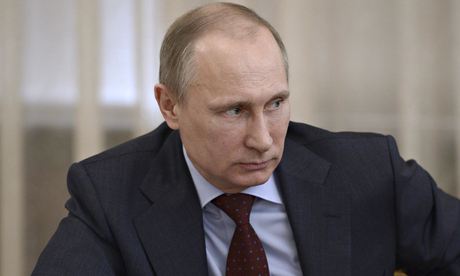Russia demands $3.8bn security deposit from Visa and Mastercard.

The law, signed by Vladimir Putin, was spurred by Visa and Mastercard’s decision on 21 March to stop servicing payments for clients of Rossiya Bank. Photograph: Ria Novosti/Reuters
International credit card companies face a "severe impact" on their operations in Russia following a strict new law Moscow has adopted in response to Visa and Mastercard freezing service to banks under US sanctions.
Visa described the regulations as "unprecedented" and Mastercard said it could experience difficulties, the Russian magazine Snob reported, after Vladimir Putin signed a law on Monday to create a rival national payment system.
The law stipulates the creation of a homegrown system to facilitate cashless transactions by 1 July, but also imposes stiff new requirements on international payment systems operating in Russia.
The legislation was spurred on by Visa and Mastercard's decision on 21 March to stop servicing payments for clients of Rossiya Bank, as well as its daughter company Sobinbank. Rossiya Bank was included in the first round of US sanctions over the Ukraine crisis because it is owned by Putin associate Yury Kovalchuk and is the "personal bank for senior officials of the Russian Federation," the US Treasury said when announcing the sanctions.
Visa and Mastercard also blocked operations for cards issued by SMP Bank, which is owned by the brothers Arkady and Boris Rotenberg, who are old judo buddies of Putin's.
The new law forbids international payment systems from cutting off services to Russian clients and obliges them to base their processing centre in Russia. To ensure their good behaviour, international operators will have to place a security deposit in Russia's central bank equal to the average value of two days' worth of transactions.
Visa and Mastercard together processed $1.9bn (£1.12bn) in transactions per day last year – 90% of all cashless payments in Russia – equal to a $3.8bn security deposit, the Moscow Times reported.
The security deposit will be due in eight quarterly payments starting on 1 July. The law states that if a payment system unilaterally freezes operations for a Russian client, it is liable for a fee totalling 10% of its security deposit for each day without service.
Snob reported that Visa's representatives believed the security deposit to be too large. Visa did not comment on the report but said in a later statement that it was prepared to cooperate with Russia to solve issues related to the new law.
"Several provisions in the law are unprecedented and will have a severe impact on the payments market in Russia – particularly cardholders, financial institutions and merchants," the statement said. "We intend to work closely with the government in order to resolve these issues."
Vladimir Tikhonov, an analyst at Otkritie investment bank, said the creation of an internal payment system has been undertaken in Australia and will make Russia's financial system "more stable from outside threat" – not only sanctions, but also cyber-attacks. But even if Russia also creates its own replacement payment cards, agreements would need to be signed with foreign payment systems for these cards to work abroad, he added.
"The creation of a national payment system is not a replacement for Visa and Mastercard," Tikhonov said. "If Visa and Mastercard leave Russia, it will of course be a serious blow for both citizens and for businesses."